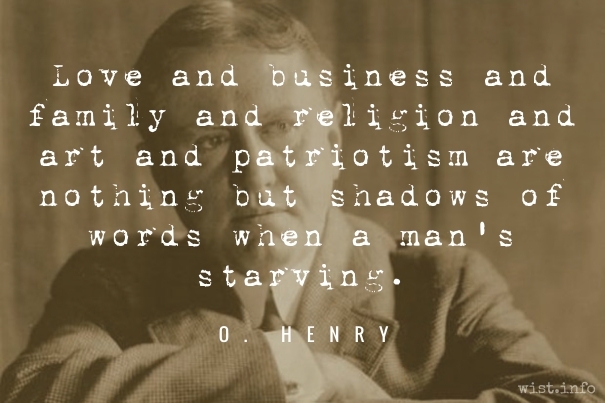You’re going to have to explain the logic of man to me, Mr. Grudge. For example, tell me how you come about your selective morality. This ease with which you strip off your conscience like an overcoat — and let your satisfied belch drown out the hunger cries that fill the air around you. How do you create the exact science whereby you disinvolve yourself from all the anguish of the world that doesn’t happen to be in your direct line of vision? That doesn’t take a special breed of man at all, Mr. Grudge. That is man in his normal condition.
Rod Serling (1924-1975) American screenwriter, playwright, television producer, narrator
A Carol for Another Christmas [Ghost of Christmas Present] (1964)
(Source)
Quotations about:
starvation
Note not all quotations have been tagged, so Search may find additional quotes on this topic.
All deaths are dour: the fate of men is sad; but there’s no death more miserable than the doom starvation sends.
[Πάντες μὲν στυγεροὶ θάνατοι δειλοῖσι βροτοῖσι,
λιμῷ δ’ οἴκτιστον θανέειν καὶ πότμον ἐπισπεῖν.]Homer (fl. 7th-8th C. BC) Greek author
The Odyssey [Ὀδύσσεια], Book 12, l. 341ff (12.341-342) [Eurylochus] (c. 700 BC) [tr. Mandelbaum (1990)]
(Source)
Urging is fellow sailors to slaughter the Sun God's cattle. That ends poorly.Original Greek. Alternate translations:
Hear what I shall say,
Though words will staunch no hunger, ev’ry death
To us poor wretches that draw temporal breath
You know is hateful; but, all know, to die
The death of Famine is a misery
Past all death loathsome.
[tr. Chapman (1616)]
Meantime Eurylochus bad counsel gives
To his companions. All deaths, quoth he,
Are hateful to what thing soever lives;
But death by hunger is the worst can be.
[tr. Hobbes (1675)]
O friends, a thousand ways frail mortals lead
To the cold tomb, and dreadful all to tread;
But dreadful most, when by a slow decay
Pale hunger wastes the manly strength away.
[tr. Pope (1725)]
Death, however caused,
Abhorrence moves in miserable man,
But death by famine is a fate of all
Most to be fear’d.
[tr. Cowper (1792)]
Friends, though to wretched men all deaths are dire,
Yet it is far most miserable to pine
With pangs of famine and for want expire.
[tr. Worsley (1861), st. 47]
Death is in all shapes to unhappy men
A fearful fate: but misery extreme
Were it our own destruction to provoke
And die of hunger.
[tr. Musgrave (1869), l. 515ff]
All deaths are hateful to us wretched mortals;
But death by famine is most pitiable.
[tr. Bigge-Wither (1869)]
Truly every shape of death is hateful to wretched mortals, but to die of hunger and so meet doom is most pitiful of all.
[tr. Butcher/Lang (1879)]
All manner of death is loathly to wretched men that die,
But to meet our fate by famine is to end most wretchedly.
[tr. Morris (1887)]
Hateful is every form of death to wretched mortals; and yet to die by hunger, and so to meet one's doom, is the most pitiful of all.
[tr. Palmer (1891)]
All deaths are bad enough, but there is none so bad as famine.
[tr. Butler (1898)]
All forms of death are hateful to wretched mortals, but to die of hunger, and so meet one's doom, is the most pitiful.
[tr. Murray (1919)]
No variety of death is pleasing to us poor mortals: but commend me to hunger and its slow perishing as the meanest fate of all.
[tr. Lawrence (1932)]
To us wretched men all forms of death are abominable, but death by starvation is the most miserable end that one can meet.
[tr. Rieu (1946)]
All deaths are hateful to us, mortal wretches, but famine is the most pitiful, the worst end that a man can come to.
[tr. Fitzgerald (1961)]
All deaths are detestable for wretched mortals,
but hunger is the sorriest way to die and encounter fate.
[tr. Lattimore (1965)]
All ways of dying are hateful to us poor mortals,
true, but to die of hunger, starve to death --
that's the worst of all.
[tr. Fagles (1996)]
Every manner of dying is hateful to miserable mortals,
but most wretched by hunger to die and encounter our doomsday.
[tr. Merrill (2002)]
To us wretched men all forms of death are abominable,
but death by starvation is the most miserable way to meet one's doom.
[tr. DCH Rieu (2002)]
All ways of dying are hateful to wretched mortals, but the most miserable way to meet one's doom is by hunger.
[tr. Verity (2016)]
All human deaths are hard to bear. But starving is most miserable of all.
[tr. Wilson (2017)]
All kinds of death are loathsome to wretched mortals,
but to die of starvation -- that's the most pitiful of fates!
[tr. Green (2018)]
For wretched human beings
all forms of death are hateful. But to die
from lack of food, to meet one’s fate like that,
is worst of all. [tr. Johnston (2019), l. 445ff]
A rich man cannot enjoy a sound mind nor a sound body without exercise and abstinence; and yet these are truly the worst ingredients of poverty.
Henry Home, Lord Kames (1696-1782) Scottish jurist, agriculturalist, philosopher, writer
Introduction to the Art of Thinking, ch. 2 (1761)
(Source)
I was often humiliated to see men disputing for a piece of bread, just as animals might have done. My feelings on this subject have very much altered since I have been personally exposed to the tortures of hunger. I have discovered, in fact, that a man, whatever may have been his origin, his education, and his habits, is governed, under certain circumstances, much more by his stomach than by his intelligence and his heart.
François Arago (1786-1853) French Catalan mathematician, physicist, astronomer, politician
Biographies of Distinguished Scientific Men, “The History of My Youth” (1859) [tr. Smyth, Powell, Grant]
(Source)
So long as there shall exist, by virtue of law and custom, decrees of damnation pronounced by society, artificially creating hells amid the civilization of earth, and adding the element of human fate to divine destiny; so long as the three great problems of the century — the degradation of man through pauperism, the corruption of woman through hunger, the crippling of children through lack of light — are unsolved; so long as social asphyxia is possible in any part of the world; — in other words, and with a still wider significance, so long as ignorance and poverty exist on earth, books of the nature of Les Misérables cannot fail to be of use.
[Tant qu’il existera, par le fait des lois et des mœurs, une damnation sociale créant artificiellement, en pleine civilisation, des enfers, et compliquant d’une fatalité humaine la destinée qui est divine; tant que les trois problèmes du siècle, la dégradation de l’homme par le prolétariat, la déchéance de la femme par la faim, l’atrophie de l’enfant par la nuit, ne seront pas résolus; tant que, dans de certaines régions, l’asphyxie sociale sera possible; en d’autres termes, et à un point de vue plus étendu encore, tant qu’il y aura sur la terre ignorance et misère, des livres de la nature de celui-ci pourront ne pas être inutiles.]
Victor Hugo (1802-1885) French writer
Les Misérables, Preface (1862) [tr. Hapgood (1887)]
(Source)
(Source (French)). Alternate translations:
So long as there shall exist, by reason of law and custom, a social condemnation, which, in the face of civilization, artificially creates hells on earth, and complicates a destiny that is divine, with human fatality; so long as the three problems of the age -- the degradation of man by poverty, the ruin of woman by starvation, and the dwarfing of childhood by physical and spiritual night -- are not solved; so long as, in certain regions, social asphyxia shall be possible ; in other words, and from a yet more extended point of view, so long as ignorance and misery remain on earth, books like this cannot be useless.
[tr. Wilbour (1862)]
As long as there shall exist, as a consequence of laws and customs, a social damnation artificially creating hells in the midst of civilization, and complicating the destiny which is divine with a fatality which is human; as long as the three problems of the age -- the degradation of man by the proletariat, the ruin of woman by hunger, the atrophy of the child by the night—are not solved; as long as in certain regions social asphyxia shall be possible; in other terms, and from a still more extended point of view, as long as there shall be on the earth ignorance and wretchedness, books of the nature of this one cannot be useless.
[tr. Wraxall (1862)]
While through the working of laws and customs there continues to exist a condition of social condemnation which artificially creates a human hell within civilization, and complicates with human fatality a destiny that is divine; while the three great problems of this century, the degradation of man in the proletariat, the subjection of women through hunger, the atrophy of the child by darkness, continue unresolved; while in some regions social asphyxia remains possible; in other words, and in still wider terms, while ignorance and poverty persist on earth, books such as this cannot fail to be of value.
[tr. Denny (1976)]
So long as there shall exist, by reason of law and custom, a social condemnation which, in the midst of civilization, artificially creates a hell on earth, and complicates with human fatality a destiny that is divine; so long as the three problems of the century -- the degradation of man by the exploitation of his labor, the ruin of woman by starvation, and the atrophy of childhood by physical and spiritual night -- are not solved; so long as, in certain regions, social asphyxia shall be possible; in other words, and, from a still broader point of view, so long as ignorance and misery remain on earth, there should be a need for books such as this.
[tr. Wilbour/Fahnestock/MacAfee (1987)]
As long as through the workings of laws and customs there exists a. damnation-by-society artificially creating hells int he very midst of civilization and complicating destiny, which is divine, with a man-made fate; as long as the three problems of the age are not resolved: the debasement of of men through proletarianization, the moral degradation of women through hunger, and the blighting of children by keeping them in darkness; as long as in certain strata social suffocation is possible; in other words and from an even broader perspective, as long as there are ignorance and poverty on earth, books of this kind may serve some purpose.
[tr. Donougher (2013)]
The murmuring poor, who will not fast in peace.
George Crabbe (1754-1832) English poet, writer, surgeon, clergyman
“The Newspaper,” l. 158 (1785)
(Source)
No man was ever more than about nine meals away from crime or suicide.
Eric Sevareid (1912-1992) American journalist [Arnold Eric Sevareid]
“A New Kind of Leadership,” speech, Conference on Vision Care, Washington, DC (26 Apr 1974)
For more discussion of this and other closely parallel quotations, see: There Are Only Nine Meals Between Mankind and Anarchy – Quote Investigator.
There is a crime here that goes beyond denunciation. There is a sorrow here that weeping cannot symbolize. There is a failure here that topples all our success. The fertile earth, the straight tree rows, the sturdy trunks, and the ripe fruit. And children dying of pellagra must die because a profit cannot be taken from an orange. And coroners must fill in the certificate — died of malnutrition — because the food must rot, must be forced to rot.
In the eyes of the people there is the failure; and in the eyes of the hungry there is a growing wrath. In the souls of the people the grapes of wrath are filling and growing heavy, growing heavy for the vintage.














